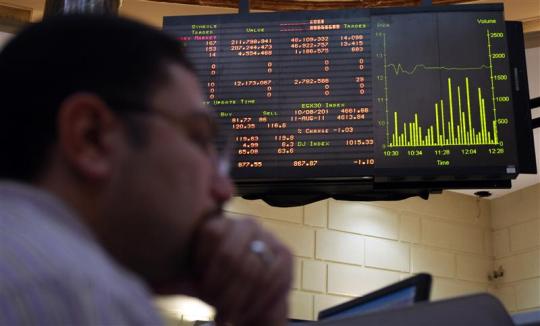Latest NEWS
- Aswat Masriya, the last word
- Roundup of Egypt's press headlines on March 15, 2017
- Roundup of Egypt's press headlines on March 14, 2017
- Former Egyptian President Hosni Mubarak to be released: lawyer
- Roundup of Egypt's press headlines on March 13, 2017
- Egypt's capital set to grow by half a million in 2017
- Egypt's wheat reserves to double with start of harvest -supply min
- Roundup of Egypt's press headlines on March 12, 2017
Egypt's economy to miss government growth forecasts - poll

Stock market, August 2011 - Amr Dalsh/REUTERS
By Patrick Werr
CAIRO, Oct 1 (Reuters) - Egypt's economy will only grow 2.6 percent in the fiscal year ending June 2014, well below the 3.5 percent the government expects to achieve, according to a Reuters poll that saw economists cutting forecasts again.
It was the second lowering of expectations in five months and portends growth much slower than needed to generate jobs for Egypt's disaffected youth.
Chances for an economic rebound were hurt by a violent crackdown of supporters of Islamist President Mohamed Mursi, who was ousted by the army on July 3 after millions of Egyptians took to the streets demanding his removal.
Clashes between security forces and Mursi supporters throughout the country in July and August left more than 1,000 people dead, prompting a nighttime curfew. The violence dampened hopes for an early return of tourists and investors.
The consensus of 10 economists polled by Reuters showed the economy will grow 2.6 percent in the fiscal year to the end of June 2014, lower than April's forecast of 3.0 percent and a September 2012 forecast of 4.0 percent.
"Growth prospects for Egypt's economy have continued to sour over the past few months," said William Jackson, an economist with Capital Economics.
The poll suggested growth would pick up to 4.0 percent in the year to June 2015.
A new army-backed government said in July that it plans to use billions of dollars in aid pledged by Gulf Arab states to spur the economy through new investments.
At a business conference on Monday, Planning Minister Ashraf al-Arabi repeated his government's forecast of 3.5 percent growth this year, up from 2 percent in 2012/13.
TOURISM HIT
Tourism had been one of the bright spots in the economy over the first half of the year.
But violence in July and August sent hotel occupancy rates to their lowest levels in years, reversing a recovery in tourism after the hammering it took during Egypt's 2011 uprising. Before 2011, tourism had accounted for around 10 percent of all economic activity.
The turmoil also made it less likely the government would make early cuts in energy subsidies, which make up 20 percent of state spending, preventing it from directing resources to investment.
Before the 2011 uprising, the economy grew at about 7 percent annually for several years. But even that pace was barely enough to produce work for the large number of Egyptian youths entering the job market.
The latest poll forecast that the Egyptian pound would weaken to 6.93 to the dollar by end-June and to 7.20 by end-June 2015.
On Tuesday, the pound was trading at 6.8915 to the dollar on the official market and at about 7.13 on the black market.
Protests late last year sparked a run on the currency that cost the central bank billions of dollars to bring under control. The official price of the pound has weakened by more than 10 percent since late December.
A depreciating currency and planned subsidy cuts were expected to fuel inflation over the coming year.
The poll predicted that inflation would inch down to 9.6 percent in 2013/14 but quicken to 9.8 percent in 2014/15.
Inflation stood at 9.7 percent in the year to August 2013, up from 6.5 percent a year earlier.
(For a poll on Gulf economies see ) (Polling by Shaloo Shrivastava Editing by Jeremy Gaunt.)










